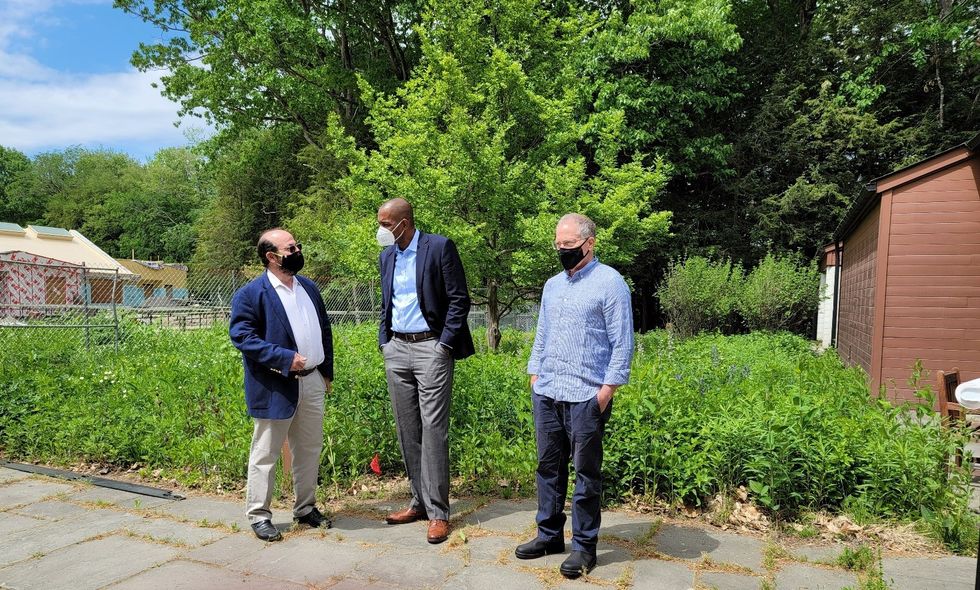MILLBROOK — Despite the fact that few things coming out of Washington, D.C., are bipartisan these days, U.S. Rep. Antonio Delgado (NY-D-19) has been working with fellow Congressmen Lee Zeldin (R-NY), Chris Smith (R-NJ) and Collin Peterson (D-MN) to introduce the STAMP Out Lyme Disease Act, which was just introduced on Tuesday, May 25, at the Cary Institute of Ecosystem Studies in Millbrook.
The legislation “directs the U.S. Postal Service to issue a Lyme Disease Research Semipostal Stamp, with all proceeds being transferred to the National Institute of Allergy and Infectious Diseases [NIAID] to study Lyme Disease,” according to Delgado’s Communications Director Matilda Bress.
It would fund research and the development of treatment for Lyme and tick-borne diseases at places like the Cary Institute, which is a lead research agency in fighting such illnesses — which run rampant in places like the Hudson Valley.
Rick Ostfeld has been a senior scientist at the Cary since 2004 and has devoted many of those years to researching Lyme and other tick-borne diseases. Ostfeld was on hand, along with Cary President Joshua Ginsberg, on the 25th when Delgado introduced the new legislation. The event was on the heels of May’s National Lyme Disease Awareness Month.
“Lyme disease is an urgent and persistent threat in our upstate New York communities,” said Delgado. “Ticks and the diseases they carry threaten our health and well-being. This bipartisan legislation will raise awareness about the disease and directly support medical research to treat and cure tick-borne diseases.”
Delgado discussed the bill with Ostfeld and Ginsberg and many others who were present and answered several questions regarding its terms, conditions and the distribution of funds collected through the semipostal stamp. Money from the sale of those stamps shall be transferred to the NIAID at least twice per year.
“As a scientist, I’m enormously encouraged that Representative Delgado and his colleagues are finding ways to increase funding for research into Lyme disease and tick biology,” said Ostfeld. “The scientific community has plenty of pressing questions about how to prevent people who live here, in the epicenter, from getting exposed, and for people who do get sick, how to properly diagnose and treat them. But this work has been underfunded for decades, so answering those questions has been very challenging.”
The prevention and treatment of Lyme disease is personal to at least two of the congressmen who worked on the STAMP Act: Zeldin has Lyme disease and Delgado has a had Lyme scare hit close to home — more than once.
“I was out of town,” Delgado said, “in D.C., when my mother called one night, telling me that my father had been bitten on his shoulder by a tick — and that was not the only time he was bitten by a tick.”
Delgado has been instrumental in making his constituents aware of the dangers of ticks for some time: in March 2019 he reminded residents that from 2007 to 2017, Lyme disease rose by 78% in his district, which stretches between Dutchess and Columbia Counties. His constituents are also keenly aware that approximately half of the adult deer ticks in the state carry the bacteria that causes Lyme disease.
Two years ago he was also a co-sponsor of the National Lyme and Tick-borne Diseases Control and Accountability Act of 2019, creating a new Office of Oversight and Coordination for Tick-Borne Diseases, requiring the creation of a national plan to address Lyme disease.
As tick-borne illnesses are on the rise, research and funding are critical, stressed the congressman. Lyme disease, for one, can be managed, but not cured.
According to the Johns Hopkins Bloomberg School of Health, it costs the U.S. more than $1,300,000,000 each year to treat sufferers of Lyme disease, which can be difficult to diagnose due to diverse symptoms and a lack of reliable testing. Between 10 to 20% of those with Lyme disease suffer chronic and disabling symptoms.
Ostfeld has produced papers, videos and podcasts on the subject, and predicts 2021 could be a particularly bad year for ticks in the Northeast. He reminds those living the region to be vigilant when outdoors: check one’s body thoroughly and often for ticks; dress appropriately, in light colors with long sleeves and long pants when outdoors; and if bitten, get tested and treated as soon as possible.
For more information, go to www.caryinstitute.org, call Delgado’s office at 518-267-4123 or go to his website at www.delgado.house.gov.









 ‘Square Quilting painting' by ransomeAlexander Wilburn
‘Square Quilting painting' by ransomeAlexander Wilburn






